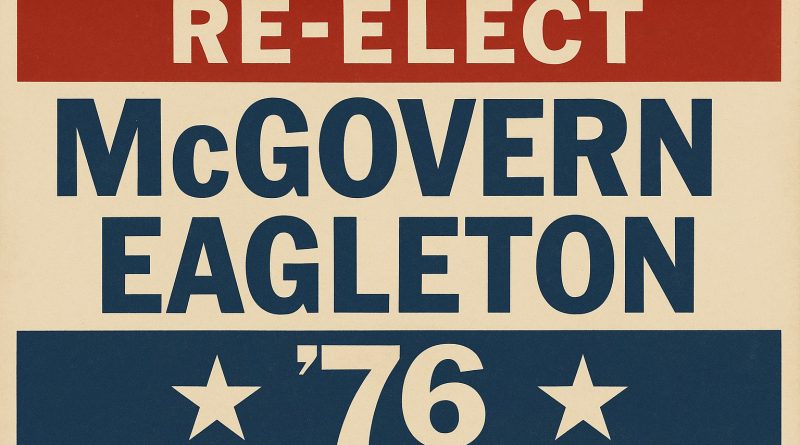Courage of Conviction: The Presidency of George McGovern
Prologue: July 25, 1972 – The Turning Point
In the summer of 1972, the Democratic campaign was in freefall. George McGovern, the antiwar Senator from South Dakota, had just secured the nomination against a fractured field. Then came the bombshell: Thomas Eagleton, his freshly announced running mate, had undergone electroshock therapy for depression.
The media pounced. Party elders panicked. Pollsters warned of a collapse.
Everyone expected McGovern to drop Eagleton.
Instead, he held a press conference on the Capitol steps and delivered the most consequential speech of his political life:
“Yes, Tom Eagleton has faced mental illness. And he beat it. He didn’t run from it. He didn’t hide it. That’s the kind of strength I want in a Vice President. And that’s the kind of honesty Americans deserve.”
He didn’t flinch. He stood with Eagleton. And within 48 hours, the public mood shifted. Mental health advocates rallied behind them. Young voters, war resisters, and working-class Americans admired McGovern’s loyalty. The narrative changed from weakness to moral courage.
The McGovern-Eagleton ticket held.
Chapter One: November Surprise (1972 Election)
As summer turned to fall, the campaign gained unexpected momentum. Nixon was still favored, but Watergate’s early rumblings and a sense of imperial arrogance in the White House began to corrode his image. McGovern capitalized on the contrast:
“We stand for peace, for healing, for a government that listens.”
Debates crystallized the differences. Nixon seemed aloof, defensive. McGovern, though idealistic, struck voters as authentic. Young people turned out in record numbers. Black voters rallied. And a growing number of women cited his defense of Eagleton as proof of empathy rare in politics.
On November 7, 1972, America delivered a surprise: McGovern won the presidency with 278 electoral votes. He swept the Northeast, the West Coast, and barely carried Illinois, Michigan, and Ohio. Nixon, stunned and angry, privately blamed “a culture of weakness and sentimentality.”
Chapter Two: The First 100 Days (1973)
McGovern entered office on January 20, 1973. His inaugural address laid out a vision of peace, justice, and structural transformation. Within the first 100 days, the administration:
- Ordered a full troop withdrawal from Vietnam, completed by May 1973.
- Established the Department of Mental Health and launched the National Mental Health Initiative, with Vice President Eagleton spearheading public education.
- Submitted legislation for a universal health insurance system.
- Cut defense spending by 20% and reallocated funds to infrastructure and education.
- Granted unconditional amnesty to draft resisters.
The Pentagon, CIA, and defense contractors bristled. But the public, weary of war and scandal, largely approved.
Yet the economy, battered by war inflation and a weakening dollar, began to show cracks.
Chapter Three: Crisis and Conscience (1974)
By 1974, inflation was high and unemployment rising. The oil embargo had triggered an energy crisis. McGovern’s response:
- Introduced rationing measures and subsidies for public transit.
- Launched the “Green Energy Moonshot,” a federally funded push toward wind, solar, and geothermal power.
- Pushed through a Windfall Profits Tax on oil companies.
But economic pain persisted. Republicans accused McGovern of overreach. Some Democrats distanced themselves.
Meanwhile, Watergate exploded.
Though Nixon had lost the election, investigations into the 1972 break-in revealed a vast criminal network stretching into the upper echelons of the former administration. In mid-1974, indictments were handed down against John Mitchell, H.R. Haldeman, and others.
McGovern addressed the nation:
“Justice delayed must not be justice denied. America must learn not just what happened, but how we let it happen.”
In August, Richard Nixon was indicted. It marked the first criminal charges ever brought against a former president.
McGovern’s moral clarity earned him renewed respect, even from former skeptics. But economically, the nation remained anxious.
Chapter Four: The Midterms and the Movement (1974-1975)
The 1974 midterms were a referendum. McGovern’s base expanded among progressives and youth, but conservative backlash was fierce. Democrats retained the Senate but lost ground in the House.
However, a new class of reformist Democrats entered Congress—many of them veterans, minorities, and first-time candidates inspired by McGovern’s ideals. Nicknamed the “Children of McGovern,” they brought a moral firebrand style to Washington.
In 1975, the McGovern administration:
- Passed the National Health Insurance Act, offering a public option to all Americans.
- Enacted the Clean Power Act, mandating emissions caps and subsidizing renewable infrastructure.
- Signed the Full Employment Guarantee Act, which created a New Deal-style public jobs program for struggling regions.
Opposition branded these moves as “creeping socialism,” but polls showed steady approval among working-class voters.
Chapter Five: 1976 Election and the End of the Beginning
The GOP, still recovering from Watergate, nominated Ronald Reagan. Charismatic and sharply anti-government, Reagan framed the election as a battle for the soul of America:
“Do we still believe in freedom, or have we surrendered it to bureaucracy and weakness?”
McGovern countered:
“Compassion is not weakness. Equality is not tyranny.”
The race was close. Reagan energized conservatives and made gains in the South and West. But McGovern held his coalition.
He won reelection with 276 electoral votes. The map looked similar to 1972 but with narrower margins.
Epilogue: Legacy of a Principled Presidency
George McGovern left office in January 1981. Though he never achieved all he set out to do, his presidency redefined the possible.
- Mental health care was no longer taboo.
- America exited Vietnam with dignity.
- Universal health coverage became a reality for millions.
- A permanent green energy sector had been seeded.
- The presidency had been restored to moral legitimacy after Nixon.
Thomas Eagleton, once considered a liability, became a national advocate and later ran for president himself in 1984.
Historians remain divided on McGovern’s economic policies, but nearly all agree on one thing:
“He governed with courage. He never abandoned his friends or his values.”
In a cynical age, George McGovern reminded the country that decency could still win.

